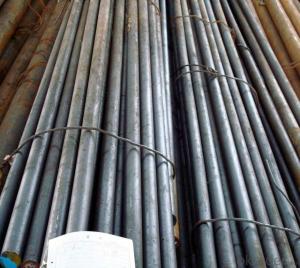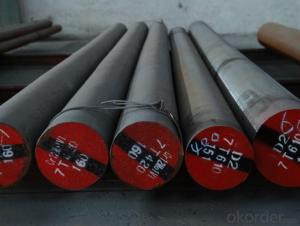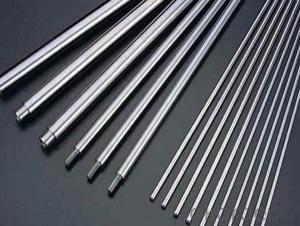High Quality Hot rolled Special Bearing Steel Bar
- Loading Port:
- Shanghai
- Payment Terms:
- TT or LC
- Min Order Qty:
- 20 m.t.
- Supply Capability:
- 500 m.t./month
OKorder Service Pledge
OKorder Financial Service
You Might Also Like
Product Description:
OKorder is offering Hot rolled Bearing Special Steel Bar at great prices with worldwide shipping. Our supplier is a world-class manufacturer of steel, with our products utilized the world over. OKorder annually supplies products to European, North American and Asian markets. We provide quotations within 24 hours of receiving an inquiry and guarantee competitive prices.
Product Applications:
Our products have been used in all kinds of areas, such as aviation, aerospace, navigation, nuclear, energy, chemical industry, electronic information, petrochemical, automotive, instrument and meter, Communication ,transportation, and medical instruments, etc. Bearing ring,steel rolling mill ,machinery, 100Cr6 bearing steel ball is widely used in high-speed and low-noise bearing, bicycle, motorcycle, automobile, bags, electronics.
Product Advantages:
OKorder's Hot rolled Bearing Special Steel Bar are durable, strong, and resist corrosion.
Main Product Features:
· Premium quality
· Prompt delivery & seaworthy packing (30 days after receiving deposit)
· Corrosion resistance
· Can be recycled and reused
· Mill test certification
· Professional Service
· Competitive pricing
Product Specifications:
Specifications of Bearing Steel
1. Dimensional sizes: Thickness: 14~100mm.Length:3000~5800mm,Diameter :14-500mm
2.Chemical composition:
C | Si | Mn | Cr | Ni | Cu |
Equal or less than | |||||
0.95-1.05 | 0.15-0.35 | 0.20-0.40 | Cr:1.30-1.65 | 0.30 | 0.25 |
3. Grade: SAE51200/ GCr15 / 100cr6
4. Heat Treatment:
Soft annealing: heat to 680-720°C, cool slowly.
Hardness after annealing: Max. 241 HB
Hardening: 820 - 850 °C
Normalizing temperature: 840-880°C
Tempering: 540-680°C
5. Surface requirements: Black, grinding, bright, polish
6. Characters:
1) Comprehensive properties
2) Good performance in cutting and processing after spheroids annealing
3) High hardness and homogenization after quenching and tempering
4) High abrasive resistance and fatigue resistance
7. Payment terms: T/T or L/C at sight
Packaging & Delivery of Bearing Steel
Mark: Heat No. will be cold stamped and Steel grade, diameter (mm), length (mm), and the manufacturer LOGO and weight (kg) is painted.
Standard seaworthy packing or as customer required
Delivery time: Within 30 days after order is confirmed.
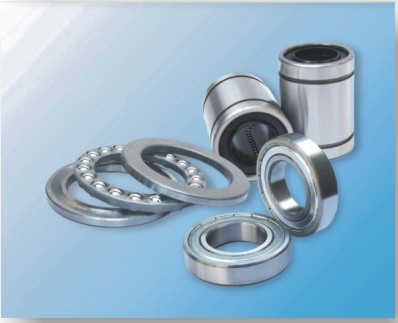
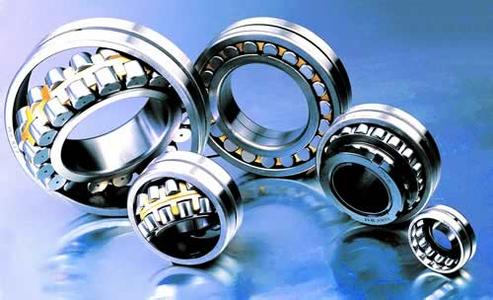
Note:
1. According to national standard (GB) for our products, if not, supply according to national standards (GB) or agreement.
2. We can not only provide electric furnace +LF+VD and electro-slag re-melting (ESR)steel forging materials, but also forging products of piece, bar, etc.
3. Our company is equipped with roll equipment and can provide our customers with roll billets or finished.
4. Please send us your detailed specifications when inquire. We will reply to you ASAP.
FAQ:
Q1: Why buy Materials & Equipment from OKorder.com?
A1: All products offered byOKorder.com are carefully selected from China's most reliable manufacturing enterprises. Through its ISO certifications, OKorder.com adheres to the highest standards and a commitment to supply chain safety and customer satisfaction.
Q2: How do we guarantee the quality of our products?
A2: We have established an advanced quality management system which conducts strict quality tests at every step, from raw materials to the final product. At the same time, we provide extensive follow-up service assurances as required.
Q3: How soon can we receive the product after purchase?
A3: Within three days of placing an order, we will begin production. The specific shipping date is dependent upon international and government factors, but is typically 7 to 10 workdays.
- Q:Is special steel suitable for structural applications?
- Yes, special steel is well-suited for structural applications. This type of steel is engineered to possess specific properties and characteristics that meet the demands of various applications. Industries such as construction, automotive, aerospace, and oil and gas often rely on special steel. The outstanding strength, durability, and resistance to corrosion of special steel make it an ideal material for structural applications. It can withstand heavy loads, high temperatures, and extreme weather conditions, ensuring the safety and longevity of structures. Furthermore, special steel offers excellent weldability, machinability, and formability, allowing for flexibility in design and construction. It can be easily shaped, fabricated, and assembled into various structural components, making it suitable for complex and unique projects. Moreover, special steel comes in a wide range of grades and types, each tailored to meet specific structural requirements. These include carbon steel, alloy steel, stainless steel, and tool steel, among others. This versatility enables engineers and designers to select the most suitable type of special steel for their specific application, ensuring optimal performance and cost-effectiveness. In conclusion, special steel is highly suitable for structural applications due to its exceptional strength, durability, resistance to corrosion, and design flexibility. The wide range of grades and types available allows engineers and designers to choose the most appropriate material for their specific project requirements.
- Q:What is the chemical composition of special steel?
- Special steel encompasses a wide range of steel alloys that possess specific properties and characteristics. The chemical makeup of special steel can differ depending on the particular grade or type of steel being discussed. Nevertheless, special steel typically contains greater amounts of alloying elements compared to regular carbon steel. These alloying elements may consist of chromium, nickel, molybdenum, vanadium, tungsten, and others. The specific combination and proportion of these alloying elements determine the distinctive properties of special steel, such as increased strength, enhanced resistance to corrosion, improved ability to withstand high temperatures, or better resistance to wear and tear. To illustrate, some common variations of special steel include stainless steel, which generally consists of high levels of chromium and nickel, resulting in excellent corrosion resistance; tool steel, which contains high carbon content and often includes additional elements like vanadium or tungsten, making it suitable for cutting, drilling, or shaping tools; and high-speed steel, which incorporates elements such as molybdenum, cobalt, or tungsten, providing exceptional hardness and heat resistance, ideal for use in cutting tools or drills. To summarize, the chemical composition of special steel varies based on the specific type or grade, but it typically involves elevated levels of alloying elements to achieve desired properties such as strength, corrosion resistance, heat resistance, or wear resistance.
- Q:How is corrosion-resistant steel used in marine applications?
- Corrosion-resistant steel is widely used in marine applications due to its ability to withstand the harsh and corrosive conditions of the marine environment. It is commonly used in the construction of ships, offshore platforms, and marine equipment. The steel's corrosion resistance properties help to prevent rusting and corrosion caused by saltwater, moisture, and other environmental factors. This increases the durability and longevity of marine structures, ensuring their safe operation and reducing maintenance costs.
- Q:What are the main factors affecting the tensile strength of special steel?
- The tensile strength of special steel is influenced by several factors. Firstly, the chemical composition of the steel plays a crucial role in determining its tensile strength. Elements such as carbon, manganese, silicon, and alloying elements like chromium, nickel, and molybdenum can significantly enhance the tensile strength of steel. These elements form solid solutions, carbides, and intermetallic compounds, which contribute to the material's ability to resist deformation under tensile loads. Secondly, the heat treatment processes applied to special steel have a profound impact on its tensile strength. Steel can be subjected to various heat treatment methods such as quenching and tempering, annealing, or precipitation hardening to achieve desired mechanical properties. These processes alter the microstructure of the steel, allowing for the formation of specific phases and grain structures that enhance its tensile strength. Additionally, the mechanical working or deformation processes that the steel undergoes can affect its tensile strength. Techniques such as rolling, forging, or extrusion can refine the grain structure and induce dislocations within the material, which can lead to an increase in tensile strength. The presence of impurities and defects within the steel can also impact its tensile strength. Inclusions, voids, or cracks can act as stress concentration points, reducing the material's overall strength. Therefore, proper quality control measures during the manufacturing process are essential to minimize these defects and ensure high tensile strength. Furthermore, the temperature at which the steel is exposed can affect its tensile strength. Special steel typically exhibits a decrease in tensile strength as temperature increases due to thermal expansion and the loss of material strength. Understanding the temperature range in which the steel will be used is crucial in selecting the appropriate grade with the desired tensile strength. In conclusion, the tensile strength of special steel is influenced by various factors including chemical composition, heat treatment, mechanical working, impurities, defects, and temperature. Considering these factors and optimizing them appropriately during the manufacturing process can result in special steel with exceptional tensile strength properties.
- Q:What is the role of boron in special steel alloys?
- Special steel alloys rely heavily on the presence of boron as it plays a crucial role in enhancing their mechanical properties and overall performance. One of the key functions of boron is to act as a hardenability agent, thereby improving the steel's hardness and strength. This is achieved by forming boride particles that act as strengthening agents within the microstructure. Moreover, boron aids in refining the grain structure of steel, resulting in improved toughness and crack resistance. It promotes the formation of fine-grained microstructures, which consequently enhance the steel's ability to withstand high temperatures, pressure, and wear. Additionally, boron assists in the solidification process of steel, reducing the risk of hot cracking during casting or welding. It accomplishes this by lowering the steel's melting point, allowing for better fluidity and improved flowability during manufacturing processes. Furthermore, the inclusion of boron in steel alloys also enhances their machinability, making them easier to work with and reducing tool wear. In conclusion, the addition of boron to special steel alloys significantly contributes to their strength, hardness, toughness, and resistance to various forms of degradation. Its role is crucial in optimizing the performance and durability of these alloys in demanding applications such as automotive components, aerospace structures, and industrial machinery.
- Q:Can special steel be used in railway applications?
- Railway applications often utilize special steel, which is also referred to as alloy steel or high-strength steel. This type of steel possesses distinct characteristics that make it suitable for a wide range of demanding applications, including railways. Its exceptional strength, durability, and resistance to wear make it an ideal choice for railway components that endure high loads, vibrations, and extreme conditions. In the realm of railway applications, special steel is commonly employed in the manufacturing of rails, wheels, axles, and other crucial components. Rails crafted from special steel have the ability to handle heavy train traffic while providing a smooth and stable ride, all the while resisting wear and deformation. Special steel wheels and axles offer remarkable strength and toughness, ensuring safe and dependable operation even under heavy loads and high-speed conditions. Furthermore, special steel is frequently utilized in the construction of railway bridges, tunnels, and other infrastructure projects. Its exceptional strength and resistance to corrosion and fatigue make it suitable for supporting heavy trains and withstanding the environmental challenges associated with railway construction. Moreover, the utilization of special steel in railway applications can result in cost savings and efficiency improvements. Its high durability and wear resistance minimize the need for frequent maintenance and replacement, leading to reduced maintenance costs and an extended service life for railway components. In conclusion, special steel possesses the necessary strength, durability, and performance required for railway applications. Its unique properties make it an ideal choice for ensuring the safety, reliability, and efficiency of rail transportation systems.
- Q:What are the different types of nitriding steel?
- There are several different types of nitriding steel, including gas nitriding steel, liquid nitriding steel, salt bath nitriding steel, and plasma nitriding steel.
- Q:How does special steel perform in high-temperature creep?
- Special steel is specifically designed to perform well in high-temperature creep conditions. Creep refers to the tendency of a material to deform under constant stress over time at elevated temperatures. Special steel exhibits excellent resistance to creep due to its unique composition and heat treatment processes. The alloying elements used in special steel, such as chromium, nickel, and molybdenum, significantly enhance its high-temperature strength and creep resistance. These alloying elements form stable carbides and improve the material's ability to retain its structural integrity even at elevated temperatures. Furthermore, special steel is often subjected to specific heat treatment methods, such as annealing or quenching and tempering, to further enhance its creep resistance. These processes help in refining the microstructure of the steel, reducing the presence of internal stresses, and improving its overall mechanical properties. The combination of alloying elements and heat treatment processes in special steel provides it with exceptional creep resistance. It can withstand prolonged exposure to high temperatures without significant deformation or failure. This makes special steel an ideal choice for applications that involve high-temperature and high-stress conditions, such as gas turbines, petrochemical plants, and power generation facilities. Overall, the performance of special steel in high-temperature creep is outstanding, and it is widely recognized as a reliable and durable material for applications requiring resistance to thermal deformation and long-term stability under constant stress.
- Q:What are the applications of special steel in the electronics industry?
- Special steel is widely used in the electronics industry due to its unique properties and benefits. Some of the applications of special steel in this industry include the manufacturing of electronic components, such as connectors, springs, and contacts, which require high strength and corrosion resistance. Special steel is also used in the production of magnetic cores for transformers and inductors, as it exhibits excellent magnetic properties. Additionally, special steel is utilized in the fabrication of precision tools and equipment used in electronics manufacturing processes, ensuring high precision, durability, and reliability. Overall, the applications of special steel in the electronics industry contribute to enhanced performance, efficiency, and longevity of electronic devices and systems.
- Q:How does the corrosion resistance of special steel compare to regular steel?
- The corrosion resistance of special steel is generally superior to regular steel. Special steel is specifically designed to have enhanced resistance against corrosion due to its composition and manufacturing process. It often contains higher levels of alloying elements such as chromium, nickel, and molybdenum, which form a protective layer on the surface of the steel, preventing it from reacting with corrosive substances. Regular steel, on the other hand, typically has a lower corrosion resistance due to its composition and lack of alloying elements. It is more prone to rusting and other forms of corrosion when exposed to moisture, atmospheric gases, or chemicals. Furthermore, special steels may undergo additional treatments such as heat treatment, passivation, or coating to further enhance their corrosion resistance. These treatments help create a barrier against corrosive agents, extending the lifespan and durability of the steel in corrosive environments. In summary, special steel offers superior corrosion resistance compared to regular steel due to its composition, alloying elements, and additional treatments. This makes it a preferred choice in applications where corrosion resistance is critical, such as in marine environments, chemical processing plants, or infrastructure exposed to harsh weather conditions.
1. Manufacturer Overview |
|
|---|---|
| Location | |
| Year Established | |
| Annual Output Value | |
| Main Markets | |
| Company Certifications | |
2. Manufacturer Certificates |
|
|---|---|
| a) Certification Name | |
| Range | |
| Reference | |
| Validity Period | |
3. Manufacturer Capability |
|
|---|---|
| a)Trade Capacity | |
| Nearest Port | |
| Export Percentage | |
| No.of Employees in Trade Department | |
| Language Spoken: | |
| b)Factory Information | |
| Factory Size: | |
| No. of Production Lines | |
| Contract Manufacturing | |
| Product Price Range | |
Send your message to us
High Quality Hot rolled Special Bearing Steel Bar
- Loading Port:
- Shanghai
- Payment Terms:
- TT or LC
- Min Order Qty:
- 20 m.t.
- Supply Capability:
- 500 m.t./month
OKorder Service Pledge
OKorder Financial Service
Similar products
New products
Hot products
Related keywords
